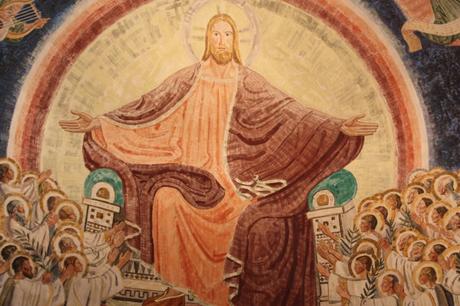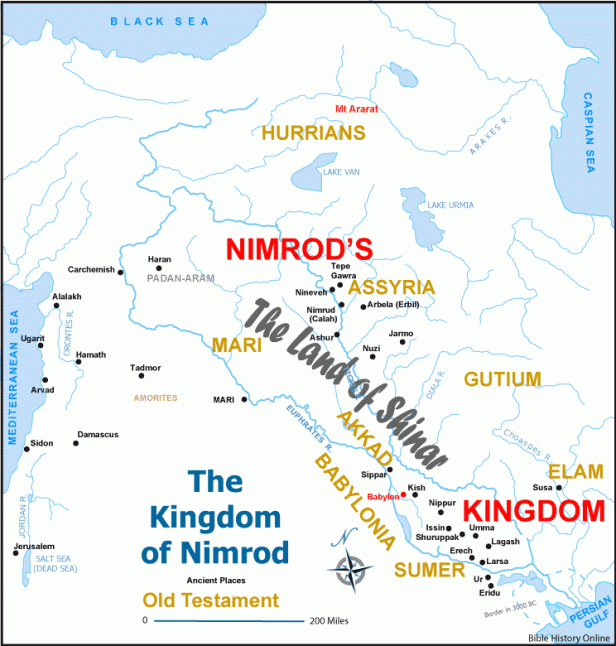Grace Thoughts
Crowns and Thrones: The Majesty of Our God (Part Four)

In the last part of our study we looked at the early kingdom of Nimrod, a great-grandson of Noah. He is the first person mentioned in the Bible as having an earthly kingdom. What is a kingdom? The simple definition is “a country, state, or territory ruled by a king or queen” (Oxford). Kings or queens are necessary for an area of land to to be called a kingdom.
Nimrod’s Kingdom
Nimrod’s kingdom included many cities in ancient Mesopotamia. The physical size of his kingdom was massive. It included both Shinar and Assyria, which today would include most of Iraq, Syria and parts of Turkey. It covered hundreds of miles in all directions. Nimrod would have to have been a powerful warrior king in order to expand and defend such a large kingdom. We showed this map of Nimrod’s kingdom in the last part of our study.
 Courtesy: Bible History Online
Courtesy: Bible History Online
Kings in the Bible
The first kings mentioned in the Bible after Nimrod are found in Genesis 14. The context is Abram and Lot moving their families and flocks in separate directions. “Abram dwelt in the land of Canaan, and Lot dwelt in the cities of the plain and pitched his tent even as far as Sodom.” (Genesis 13:12) This move caused problems for both men because of these kings –
- Amraphel king of Shinar
- Arioch king of Ellasar
- Chedorlaomer king of Elam
- Tidal king of nations
- Bera king of Sodom
- Birsha king of Gomorrah
- Shinab king of Admah
- Shemeber king of Zeboiim
- the king of Bela (that is, Zoar)
Some of the kings had been subservient to stronger kings for many years (twelve years mentioned in Genesis 14) and got tired of being under the thumb of those stronger kings and kingdoms. So, the subservient kings rebelled. That happened often in the ancient world. In this case, Bera king of Sodom, Birsha king of Gomorrah, Shinar king of Admah, Shemeber king of Zeboiim, and the king of Bela (Zoar) rebelled in the thirteenth year and joined together in the Valley of Siddim, also known as the Salt Sea (also known as the Dead Sea bordering Israel to the west and Jordan to the east). Those kings and their city-state kingdoms were located many miles west of the dominant kings.
Chedorlaomer king of Elam, Amraphel king of Shinar, Arioch king of Ellasar, and Tidal king of nations were from eastern city-state kingdoms where Nimrod had ruled years before. They attacked the Rephaim in Ashteroth Karnaim, the Zuzim in Ham, the Emim in Shaveh Kiriathaim, and the Horites in their mountain of Seir, as far as El Paran, which is by the wilderness. Then the kings and their armies went to En Mishpat (Kadesh) and attacked all the country of the Amelekites, along with the Amorites who lived in Hazezon Tamar.
Before we move forward with this story, let’s acknowledge that it’s not easy to grasp all that’s going on here because of our unfamiliarity with the names and places listed in Genesis 14. We need to do a bit of research to understand what a big deal this was for those involved. One of the things I like about these ancient details is they can be investigated. It’s one of the reasons I eventually left atheism for Christianity. Details can be confirmed or falsified. You can find archaeological information about each of the city-states mentioned in the Bible. I wrote a 36-part study about Old Testament archeology on our sister blog, Faith and Self Defense. We wrote the series over a period of four-and-a-half years and combined them into three eBooks available for free here.
I might note here that the Convince Me There’s A God series (started nine years ago and still ongoing) is based on the evidence I investigated in 1971 that led me to believe in the existence of God, the reliability of the Bible, and the reality of the life, death and resurrection of Jesus Christ. I will look at archaeological evidence for the Bible discovered after 1971 in a future series.
Ancient kingdoms were usually city-states rather than giant countries as we might think of kingdoms now. Some city-states had a larger population and bigger army and were able to defeat or threaten smaller city-states into submission. Nimrod was so successful as earth’s first king because he was a powerful warrior king and established his kingdom based on building a group of city-states spread across a huge area of land (most of Mesopotamia). Based on what we know from history and archaeology, the size of Nimrod’s kingdom diminished in size at some point, probably because of warring factions among leaders who came into power at a later time. Again, that’s something we often see in history. A powerful king is defeated or dies and their kingdom is often divided into smaller kingdoms because of warring factions. What we see in Genesis 14 is the first biblical example of war involving kings of city-state kingdoms.
The battle did not go well for the kings of Sodom and Gomorrah. Some of their soldiers died in battle, others fled to the mountains. The victorious kings and their soldiers took all the goods of Sodom and Gomorrah, including all their provisions, and went their way – probably heading for home with the spoils of war. They also kidnapped Lot, family members and his goods. When Abram learned about the capture of his nephew, he armed 318 of his trained servants and went in pursuit as far as Dan (a Canaanite city at the time – later a city in northern Israel). Abram divided his servants against the kidnapping armies by night and attacked them. Abram’s servants won the battle and brought back Lot and all his goods, including women and other people who were taken into captivity. It’s amazing that an old man and 318 servants were able to physically accomplish that, so we might consider the part God may have played in the victory.
Genesis 14:17 tells us that Abram defeated Chedorlaomer and the kings who were him. Hebrews 7:1 says that Abram slaughtered the kings.
Genesis 14 and Hebrews 7 also tell us that Abram met another king on his return home from recovering Lot and his family. That king’s name was Melchizedek and he was the king of Salem.
“Then Melchizedek king of Salem brought out bread and wine; he was the priest of God Most High. And he blessed him and said: Blessed be Abram of God Most High, Possessor of heaven and earth; And blessed be God Most High, Who has delivered your enemies into your hand. And he gave him a tithe of all.”
Genesis 14:18-20
“For this Melchizedek, king of Salem, priest of the Most High God, who met Abraham returning from the slaughter of the kings and blessed him, to whom also Abraham gave a tenth part of all, first being translated ‘king of righteousness,/ and then also king of Salem, meaning ‘king of peace,’ without father, without mother, without genealogy, having neither beginning of days nor end of life, but made like the Son of God, remains a priest continually.”
Hebrews 7:1-3
The verse that preceded Hebrews 7:1 reads – “where the forerunner has entered for us, even Jesus, having become High Priest forever according to the order of Melchizedek” (Hebrews 6:19) This demonstrates that Melchizedek has a special place in our understanding of the role God’s Son would play in the life of Abram, Israel and the Church.
First, Jesus would be a different kind of King. King David wrote this about the Messianic King in Psalm 110 –
“Your people shall be volunteers In the day of Your power; In the beauties of holiness, from the womb of the morning, You have the dew of Your youth. The Lord has sworn And will not relent, ‘You are a priest forever According to the order of Melchizedek.’ The Lord is at Your right hand; He shall execute kings in the day of His wrath.”
Psalm 110:3-5
The writer of Hebrews made clear that Jesus would be a different kind of Priest –
“So also Christ did not glorify Himself to become High Priest, but it was He who said to Him: ‘You are My Son, Today I have begotten You.’ As He also says in another place: ‘You are a priest forever According to the order of Melchizedek’; who, in the days of His flesh, when He had offered up prayers and supplications, with vehement cries and tears to Him who was able to save Him from death, and was heard because of His godly fear, though He was a Son, yet He learned obedience by the things which He suffered. And having been perfected, He became the author of eternal salvation to all who obey Him, called by God as High Priest ‘according to the order of Melchizedek,’ of whom we have much to say, and hard to explain, since you have become dull of hearing.”
Hebrews 5:5-11
As to the question of who paid tithes to whom, Hebrews 7 answers that for us –
“Now consider how great this man was, to whom even the patriarch Abraham gave a tenth of the spoils. And indeed those who are of the sons of Levi, who receive the priesthood, have a commandment to receive tithes from the people according to the law, that is, from their brethren, though they have come from the loins of Abraham; but he whose genealogy is not derived from them received tithes from Abraham and blessed him who had the promises. Now beyond all contradiction the lesser is blessed by the better. Here mortal men receive tithes, but there he receives them, of whom it is witnessed that he lives. Even Levi, who receives tithes, paid tithes through Abraham, so to speak, for he was still in the loins of his father when Melchizedek met him.”
Hebrews 7:4-10
Abram had one more encounter with the King of Sodom before God destroyed the cities of Sodom and Gomorrah –
“Now the king of Sodom said to Abram, ‘Give me the persons, and take the goods for yourself.’ But Abram said to the king of Sodom, ‘I have raised my hand to the Lord, God Most High, the Possessor of heaven and earth, that I will take nothing, from a thread to a sandal strap, and that I will not take anything that is yours, lest you should say, ‘I have made Abram rich’— except only what the young men have eaten, and the portion of the men who went with me: Aner, Eshcol, and Mamre; let them take their portion.”
Genesis 14:21-24
Even though God did not call Abram a king, God did tell him he would be the father of many nations and that kings would come from him. The same was true for Sarai –
“No longer shall your name be called Abram, but your name shall be Abraham; for I have made you a father of many nations. I will make you exceedingly fruitful; and I will make nations of you, and kings shall come from you. And I will establish My covenant between Me and you and your descendants after you in their generations, for an everlasting covenant, to be God to you and your descendants after you … Then God said to Abraham, ‘As for Sarai your wife, you shall not call her name Sarai, but Sarah shall be her name. And I will bless her and also give you a son by her; then I will bless her, and she shall be a mother of nations; kings of peoples shall be from her.”
Genesis 17:5-7, 15-16
Next Time
In the next part of our study about Crowns and Thrones: The Majesty of Our God, we’ll look at some of the kings who came from Abraham and Sarah.
Scripture taken from the New King James Version®. Copyright © 1982 by Thomas Nelson. Used by permission. All rights reserved.
 AbrahamAncient KingsJesus ChristSarah
AbrahamAncient KingsJesus ChristSarah

Published by gracelifethoughts
Founder & Director of GraceLife Ministries View all posts by gracelifethoughts
